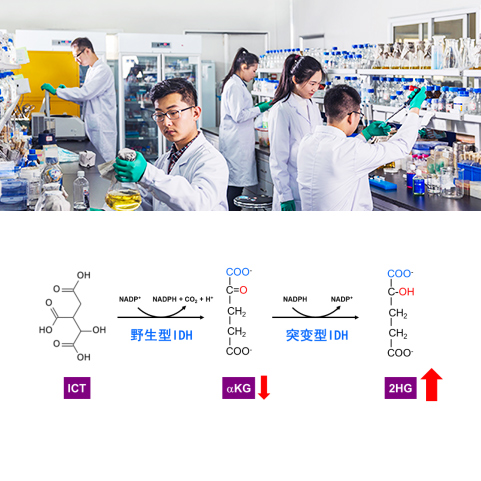

In 1924, Dr. Otto Warbug demostrated that unlike normal somatic cells, cancer cells prefer glycolysis over oxidative phosphorylation to generate energy. Accumulating evidence has proved that abnormal metabolism is acommon feature of most cancer cells, in terms of glycolysis and other metabolic pathways. Reprogrammed metabolism satisfies the need of biosynthesis required by fast proliferating cancer cells, but also may pose a vulnerability if a proper target is drugged.
While altered oncogenic signaling and/or loss of tumor suppressors contribute to switched cancer metabolism, malfunction of metabolic enzymes is the driver in some cancers. One example is the frequent mutation of IDH1/2 (isocitrate dehydrogenase) genes in glioma (80%), AML (20%), cartilaginous tumors (75%), intrahepatic cholangiocarcinoma (20%) and some other tumors. Wild type IDH proteins catalyze the oxidation of isocitrate to α-ketoglutarate(α-KG) in cells. Mutations identified in these tumors usually confer a neomorphic enzymatic activity: reducing α-KG to 2-hydroxygluatrate (2-HG). Scientists in Meton discovered that accumulated intratumoral 2-HG competes with α-KG for binding to α-KG-dependent dioxygenases, which include Jmjc histone demethylase and TET family of 5mC DNA hydroxylases. Inhibition of these dioxygenases changes global epigenetic status and thus promotes tumorigenesis. This defines 2-HG as an onco-metabolite. Decreasing 2-HG level by manipulating mutant IDH gene expression has shown effectiveness in decreasing or halting tumor progression in model animals, proposing mutant IDH as a potential drug target for treating tumors mentioned above.
Meton are now developing novel small molecule inhibitors targeting IDH1 and IDH2 mutant respectively. We have finished target-to-hit screening, got lead compounds for both projects and are in the middle of optimization to PCC.